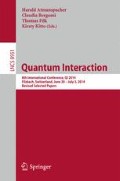Abstract
We present the detailed account of the quantum(-like) viewpoint to common knowledge. The Binmore-Brandenburger operator approach to the notion of common knowledge is extended to the quantum case. We develop a special quantum(-like) model of common knowledge based on information representations of agents which can be operationally represented by Hermitian operators. For simplicity, we assume that each agent constructs her/his information representation by using just one operator. However, different agents use in general representations based on noncommuting operators, i.e., incompatible representations. The quantum analog of basic system of common knowledge features \(\mathcal{K}1-\mathcal{K}5\) is derived.
Access this chapter
Tax calculation will be finalised at checkout
Purchases are for personal use only
Notes
- 1.
The general discussion on the meaning of the state of the world is presented in our second conference paper [8]. It is important to remark that in models of qunatum cognition states are typically not physical states, but information states. They give the mental representation of the state of affairs in human society in general or in a social group of people. In particular, such a \(\psi \) can be the mental representation of a real physical phenomenon. However, even in this case \(\psi \) is not identified with the corresponding physical state. (By using the terminology invented by H. Atmanspacher and H. Primas, see, e.g., [12], we can consider the physical state as an ontic state and its mental image as an epistemic state.) This interpretation of representation of a state of the world by a pure quantum state matches well with the information interpretation of quantum mechanics (due to Zeilinger and Brukner). Roughly speaking this \(\psi \)-function is not in nature, but in heads of people. See Remark 1 for further discussion.
- 2.
The first point is related to the discussion in Footnote 1. The \(\psi _{MH17}\) is not the actual physical state! The real physical state of affairs can be (mentally) identified either with \(e_K\) or with \(e_D;\) the ontic state by the Atmanspacher-Primas terminology. However, one has be careful in putting too much weight to the ontic state. It might happen that it would be never known.
References
Binmore, K., Brandenburger, A.: Common knowledge and game theory. ST/ICERD Discussion Paper 88/167, London School of Economics (1988)
Aumann, R.J.: Agreeing on disagree. Ann. Stat. 4, 1236–1239 (1976)
Aumann, R.J.: Backward induction and common knowledge of rationality. Games Econ. Behav. 8, 6–19 (1995)
Khrennikov, A.: Information Dynamics in Cognitive, Psychological, Social, and Anomalous Phenomena. Fundamental Theories of Physics. Kluwer, Dordreht (2004)
Khrennikov, A.: Ubiquitous Quantum Structure: From Psychology to Finances. Springer, Heidelberg (2010)
Busemeyer, J.R., Bruza, P.D.: Quantum Models of Cognition and Decision. Cambridge Press, Cambridge (2012)
Haven, E., Khrennikov, A.: Quantum Social Science. Cambridge Press, Cambridge (2013)
Khrennikov, A., Basieva, I.: Quantum(-like) decision making: on validity of the Aumann theorem. In: Atmanspacher, H., Bergomi, C., Filk, T., Kitto, K. (eds.) QI 2014. LNCS, vol. 8951, pp. 105–118. Springer, Heidelberg (2014)
Asano, M., Basieva, I., Khrennikov, A., Ohya, M., Yamato, I.: Non-Kolmogorovian approach to the context-dependent systems breaking the classical probability law. Found. Phys. 43, 2083–2099 (2013)
Khrennikov, A., Basieva, I., Dzhafarov, E.N., Busemeyer, J.R.: Quantum Models for Psychological Measurements: An Unsolved Problem. arXiv:1403.3654 (q-bio.NC), Neurons and Cognition (2014)
Basieva, I., Khrennikov, A.: Observables generalizing positive operator valued measures. In: Khrennikov, A., Atmanspacher, H., Migdall, A., Polyakov, S. (eds.) Quantum Theory: Reconsideration of Foundations-6, Conference Proceedings, vol. 1508, pp. 94–83. AIP, Melville (2012)
Atmanspacher, H., Primas, H.: Epistemic and ontic quantum realities. In: Adenier, G., Khrennikov, A. (eds.) Foundations of Probability and Physics-3, Conference Proceedings, vol. 750, pp. 49–62. AIP, Melville (2005)
Kripke, S.A.: Semantical considerations on modal logic. Acta Philosophica Fennica 16, 83–94 (1963)
Garola, C.: A Pragmatic Interpretation of Quantum Logic. Preprint. arXiv:quant-ph/0507122v2
Garola, C., Sozzo, S.: Recovering nonstandard logics within an extended classical framework. Erkenntnis 78, 399–419 (2013)
Khrennikov, A., Schumann, A.: Quantum Non-objectivity from Performativity of Quantum Phenomena. Preprint. arXiv:1404.7077 [physics.gen-ph]. (To be published in Physica Scripta)
Khrennikov, A.: Contextual Approach to Quantum Formalism. Springer, Heidelberg (2009)
Von Neuman, J.: Mathematical Foundations of Quantum Mechanics. Princeton University Press, Princeton (1955)
Acknowledgments
The authors would like to thank C. Garola, E. Rosinger, and A. Schumann for resent exchange of ideas about the logical structure of quantum propositions.
Author information
Authors and Affiliations
Corresponding author
Editor information
Editors and Affiliations
Rights and permissions
Copyright information
© 2015 Springer International Publishing Switzerland
About this paper
Cite this paper
Basieva, I., Khrennikov, A. (2015). Quantum(-like) Formalization of Common Knowledge: Binmore-Brandenburger Operator Approach. In: Atmanspacher, H., Bergomi, C., Filk, T., Kitto, K. (eds) Quantum Interaction. QI 2014. Lecture Notes in Computer Science(), vol 8951. Springer, Cham. https://doi.org/10.1007/978-3-319-15931-7_8
Download citation
DOI: https://doi.org/10.1007/978-3-319-15931-7_8
Published:
Publisher Name: Springer, Cham
Print ISBN: 978-3-319-15930-0
Online ISBN: 978-3-319-15931-7
eBook Packages: Computer ScienceComputer Science (R0)

